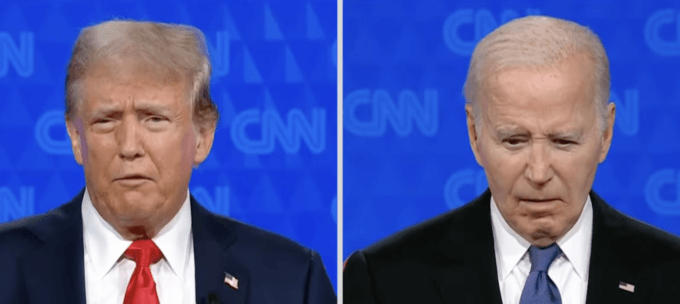

Screenshot from NBC News Livestream
Last week’s Biden-Trump debate harmed U.S. foreign policy, and the international community was left to debate what was said and what was left unsaid. In view of the harmful potential for wider wars in East Europe and the Middle East in addition to the potential for China’s increased military pressure on Taiwan, it is shocking that only ten minutes of the 90-minute debate was devoted to national security policy. The inept CNN moderators—Jake Tapper and Dana Bash—were partly responsible because of the dearth of questions on foreign policy. Nevertheless, the answers provided by President Joe Biden and former president Donald Trump were shocking for their misinformation and their polemics.
The debate was incoherent for the most part due to Biden’s lack of sharpness as well as Trump’s ignorance and boorish manner. There was no reason to expect a substantive exchange or even some enlightenment on the wars between Russia and Ukraine and between Israel and Hamas. But the incoherence of both men certainly signaled to President Vladimir Putin and Prime Minister Benjamin Netanyahu that they have a free hand in their respective confrontations and that the United States has no leverage, let alone policy, for ending two terrible and costly wars that could be expanded in the coming months. The debate did immeasurable harm to U.S. interests.
The moderators were TV anchors accustomed to reading teleprompters rather than offering insight into specific policy matters. Previous debates engendered more serious discussion when print journalists, such as Max Frankel of the New York Times or Marvin Kalb, performed as moderators and could handle a discussion on national security. CNN’s anchors, Tapper and Bash, asked nothing about defense policy and defense spending, although the Pentagon’s budget is soon to reach the level of $1 trillion. U.S. power projection capabilities were not addressed, and the modernization of our strategic capability, which already exists at overkill levels, was not introduced.
Tapper and Bash provided no opening for discussion of relations with China—the most important bilateral relationship on the U.S. agenda—or with Russia. This oversight was particularly troubling in view of the close relations that now exist between Moscow and Beijing, and the fact that preventing such rapprochement was once upon a time the sine qua non of U.S. national security policy. The template for dealing with the triangular relationship was provided by President Richard Nixon and national security adviser Henry Kissinger, but their effective policy has been lost to the ages.
Biden’s administration has provided arms to Ukraine on a regular basis, but has never developed a policy regarding the war and how to end it. When this subject was raised, all Biden could do was to state tired shibboleths about Putin seeking to restore the “Soviet Empire” and considering the use of force against Poland or the Baltic states. Biden incorrectly referred to Belarus as a NATO country, and said that Belarus would be at risk if Putin were allowed to “take Ukraine.” Putin is in fact tied down in a war of attrition, and his inability to deal with Ukraine in a conventional confrontation does not bode well for taking on any country that is part of a NATO alliance that circumscribes his western border.
Trump’s predictable response was that, if he were in the White House, the Russians would never have invaded Ukraine in the first place. When Trump was pressed, his blusterous response turned on the ridiculous charge regarding Biden that the military “can’t stand him” and “they like me more than just about any of them, and that’s based on every single bit of
information.” Trump reached a new low when he charged that Biden “encouraged Russia going in (sic).” Putin has settled into a war of attrition, and the debate must tell him that neither Biden nor Trump has any ideas regarding dialogue, let alone negotiation. “Before I take office on January 20,” Trump harrumphed, “I’ll have that war settled.”
The discussion regarding Israel and Gaza was even worse. The essential fact is that Biden was wrong about Netanyahu from the start, and his talk of “red lines,” two-state solutions, and cease-fires was just that—talk! Biden believed that if he assured Netanyahu that Israel would get all the weaponry he desired, then Biden would have some influence over the Israeli leader. In doing so, Biden ignored that past 25 years of bilateral relations with Israel that demonstrated Netanyahu’s belief that he could manage any U.S. administration and never have to pay a price.
Trump’s response was similar to the issue regarding Ukraine. If he had been in the White House, according to Trump, Putin “never would have invaded Ukraine, never, just like Israel would have never been invaded in a million years by Hamas.” Trump went further in arguing that there was “no terror at all during my administration,” whereas the “whole world is blowing up under him (Biden).” Trump charged that Biden had “become like a Palestinian, but they don’t like him because he’s a very bad Palestinian.” And this man could be returned to the White House?
During his four-year term, Trump gave Israelis everything they sought, including an embassy in Jerusalem; end to financial support for the Palestinians; approval for West Bank settlements; and recognition of the Golan Heights as part of Israel. Trump abrogated the Iran nuclear accord, just like Netanyahu wanted him to do. Like Putin, Netanyahu must believe he is home free if he had to deal with either Biden or Trump in the coming years.
The post How the Presidential Debate Harmed US Foreign Policy appeared first on CounterPunch.org.
This content originally appeared on CounterPunch.org and was authored by Melvin Goodman.